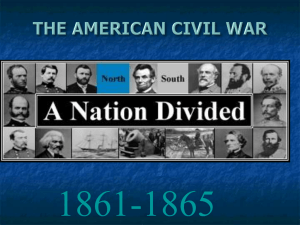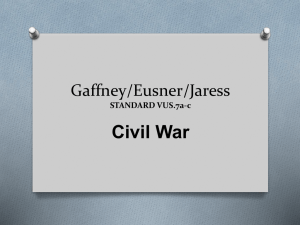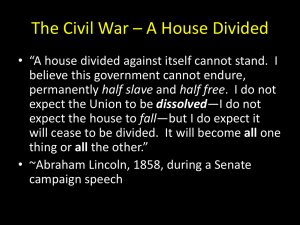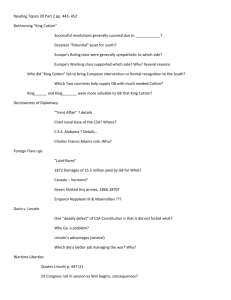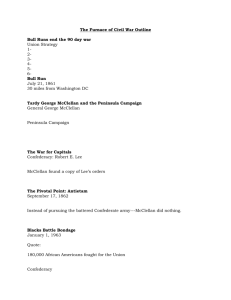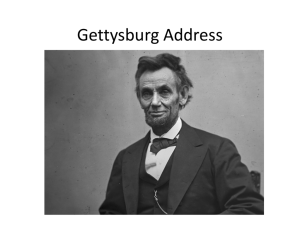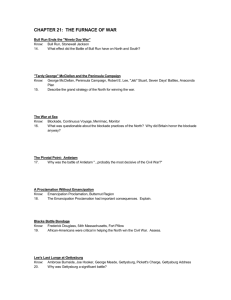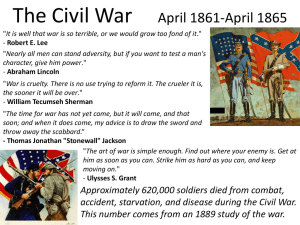THE AMERICAN CIVIL WAR
advertisement
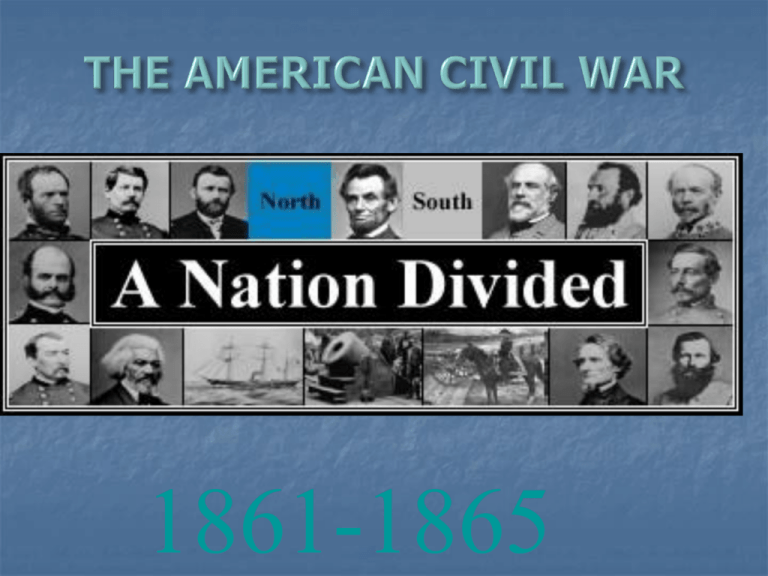
1861-1865 - population - 22 million - 90% of ind. goods, esp. munitions - efficient railroad system - controlled the navy, which could be used to blockade s. ports and shut down the s. eco. - but would have to fight an offensive war (long supply lines, unfamiliar territory...) - capable mil. leaders, inc. Ulysses S. Grant Confederates had excellent generals too Robert E. Lee and Thomas Jackson Defending is always easier than attacking - (familiar w/climate and territory, possible psychological advantages) Farmers fight better than factory workers Profitable eco. based on cotton exports But disadvantages…a smaller pop. of 9 million (inc. 3.5 million slaves) had to import ind. goods; very The S. was looking for an add. adv., namely an alliance w/ GB (since GB industry was dependent on "King Cotton")...but GB was wary of events and did not want to become involved: GB had stockpiled cotton as the conflict was escalating; they had also found other sources (Madras, India) most Br. workers who lost their jobs in cotton factories had been able to find work in the new munitions factories that were mostly supplying the N. most Br. citizens resented slavery Br. crop failures had led to increased grain trade w/ the N. A Br. ship. the Trent, was intercepted by the N. on its way to GB from the S.; it was carrying S. "ambassadors"...the N. resented Br. interference, leading some to call for war; Lincoln simply defused the situation by releasing the ship and the southern "agents" GB had also sold several ships to the S., namely the Florida and the Alabama - they had sunk many n. ships A few southerners had managed to get into BNA, from which they launched several raids into the N.; this inc. a # of bank robberies in Vt. (the best known was the St. Alban's Raid)...some Northerners wanted to invade BNA as punishment this forced the BNA colonies to begin to consider a Confederation to protect themselves against the US...by 1867, GB agreed w/ the Canadian "Fathers of Confederation" (Canada had become an expensive hassle for the Br…) It freed the slaves only in states that have seceded from the Union. It did not free slaves in border states. Lee realized that the South was in dire straits and decided that it was crucial to attack the North on its own territory July 1-3, 1863 - BATTLE OF GETTYSBURG, Pa. Confed. bombardment; Union held firm on July 3, General Pickett led 15,000 Confed. Troops across open fields Union mowed them down (= "Pickett’s Charge") Lee was defeated and retreated to Virgnia Gettysburg is the largest battle in the history of the Western hemisphere. Over 100, 000 people died in 3 days It was the last time the South invaded the North. that from these honored dead we take increased devotion to that cause for which they gave the last full measure of devotion -- that we here highly resolve that these dead shall not have died in vain -- that this nation, under God, shall have a new birth of freedom -- and that government of the people, by the people, for the people, shall not perish from the earth. Abe Lincoln The Monitor July 4, 1863 - another Union victory - VICKSBURG won by U.S. Grant, cut South in 1/2 and gave the Union control of Mississippi River Grant was then given control of all Union armies began a "scorched earth" policy to defeat the South General Sheridan decimated Va.'s Shenandoah Valley General Sherman given task of taking Atlanta; his "March through Georgia" saw total destruction from Atlanta to Savannah After the Emancipation Proclamation blacks began to join the Union Army Initially they were only used for manual labor Eventually, Blacks saw live combat 54th regiment out of Massachusetts William Carney April 3, 1865 - Grant took Richmond Va. - final blow to Lee's army Lee surrenders on April 9, 1865 at APPOMATTOX COURTHOUSE All Confed. troops forced to take an oath of loyalty to U.S. otherwise, terms of surrender were lenient Lincoln didn't want a humiliated South and further conflict issue of states' rights now "solved"- fed. gov't had asserted its status After four bloody years of civil war, the South was defeated. Over 618,000 military deaths during Civil War. POLITICAL / ECONOMIC DEVELOPMENTS w/o Southerners in fed. gov't, many changes occurred that benefited the North: 1) Homestead Act passed by Congress in 1862 - encouraged W. expansion w/o slavery - 165 acres given to anyone who would farm it 5 yrs. 2) Union-Pacific Railway was authorized - great trade potential, focused on the Northern States. 3) Tariffs were put in place to protect Northern industry 4) Congress established a single federal currency - same value in all states - known as "Greenbacks" 5) to cover war debts, Union gov't issued war bonds and intro'd income tax 6) in a further illustration of fed. gov't power, Lincoln's gov't restricted civil liberties so nothing would detract from Union war effort (suspended Habeas Corpus) - free press/ speech also interrupted 7) 1864 Election - only in Union - pitted Republican Lincoln against Democrat General McClellan Lincoln won easily, assuring that war will continue (N. Democrats wanted an end) EFFECTS OF CIVIL WAR creation of a single unified country abolition of slavery increased power to fed. gov't – killed the issue of states rights U.S. now an industrial nation a stronger sense of nationalism w. lands increasingly opened to settlement South was economically and physically devastated, w/ the plantation system crippled...thus Reconstruction (rebuilding the U.S.) - but a deep hatred of the North remained...
